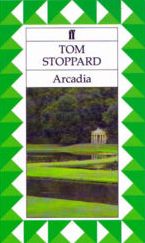
Arcadia
Tom Stoppard
London, Faber, 1993, 97p
On leaving work yesterday, I was overwhelmed by the desire to read a play. I don't read plays often, preferring prose, but I have read some weight novels recently and was in need for something light and clever. So inevitably, I ended up with Stoppard.
Arcadia is a perfect demonstration of why I love Tom Stoppard. It is a story that spans two hundred years, with a small cast and perfectly formed dialogue. In 1809, Thomasina sits at her desk with her tutor, Septimus. She is an intelligent girl, quick witted and curious, and Septimus treats her much older than her thirteen years. They are discussing complex algebra, when they are interrupted by Mr Chater, challenging Septimus to a fight.
Meanwhile, in the modern day, Bernard Nightingale arrives at the same house, eager to learn more about it's history, believing Lord Byron once visited. Bernard finds himself up against Hannah, a feisty scholar of botany who is reluctant to help the arrogant Nightingale.
It is an intelligent comedy for intellectuals. Stoppard's characters discuss classical philosophy, Newtonian theory, and Romantic poetry like it is general knowledge. Sometimes it is hard to keep up, but Stoppard has a brilliant way of explaining complicated subjects through his characters discussions. He is brilliant at producing these fully-formed beings, with no need to provide background information through contrived conversation. They just appear on the page (or on the stage) as everyday people, and we are lucky to observe their interactions.
Arcadia is set in Derbyshire, in a stately home. The house becomes a significant part of the story, bringing the two stories together. The contemporary characters are researching the earlier characters, using materials such as diaries and hunting records. They create their own stories about 1809, piecing together snippets of history to make their own truths. Only we, the audience, really know what happened, and it is equally comic and fascinating to see where the historians go wrong.
I massively regret missing the opportunity to see this play in London a few years ago, but I am so excited it is coming to Oxford in October (see link here). Anyone fancy joining me?
No comments:
Post a Comment